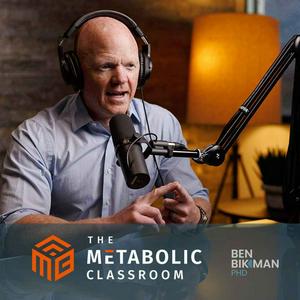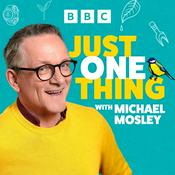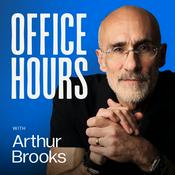137 episodes
- 📢 Ask Dr. Bikman’s Digital Mind (multilingual):
https://benbikman.com/ben-bikmans-digital-ai-mind
📢 Dr. Bikman’s Community & Coaching Site: https://insuliniq.com
Topic:
LDL cholesterol is a weak predictor of heart disease compared to markers of insulin resistance, metabolic syndrome, and the triglyceride-to-HDL ratio. True cardiovascular risk is driven far more by metabolic dysfunction than by cholesterol numbers alone.
Summary:
In this episode, Ben challenges the long-standing belief that LDL cholesterol is the primary driver of heart disease. While LDL has dominated cardiovascular conversations for decades, large-scale data show that nearly half of people hospitalized with heart disease have “normal” LDL levels.
Instead, the strongest predictors of cardiovascular risk — especially premature heart disease — are markers of metabolic dysfunction, particularly insulin resistance. Measures like the lipoprotein insulin resistance (LP-IR) score, type 2 diabetes status, metabolic syndrome, and even the simple triglyceride-to-HDL ratio dramatically outperform LDL cholesterol in predicting who will develop heart disease.
One of the most practical tools discussed is the triglyceride-to-HDL ratio, which can be calculated from a standard lipid panel. This ratio reflects underlying insulin resistance and small, dense LDL particles far better than LDL levels alone.
Dr. Bikman also reviews the modest benefits of statins in primary prevention and highlights a critical point: lowering LDL does not address the root metabolic dysfunction driving cardiovascular disease. In fact, statin use — particularly in women — may increase the risk of developing type 2 diabetes.
The takeaway is clear: cardiovascular prevention should shift from being LDL-centric to metabolism-centric. Insulin sensitivity, triglycerides, HDL, fasting insulin, and glycemic control are far more powerful indicators of risk than LDL cholesterol alone.
References:
For complete show notes and references, we invite you to become an Insider subscriber. You’ll enjoy real-time, livestream Metabolic Classroom access which includes live Q&A with Ben after the lecture, unlimited access to Dr. Bikman’s Digital Mind, ad-free podcast episodes, show notes and references, and Ben’s Weekly Research Review Podcast. Learn more: https://www.benbikman.com
NOTE: The information presented is not intended to be a substitute for professional medical advice, diagnosis, or treatment. Dr. Bikman is not a clinician—and, he is not your doctor. Always seek the advice of your own qualified health providers with questions you may have regarding medical conditions.
Ben’s favorite yerba mate and fiber: https://ufeelgreat.com/usa/en/c/1BA884
Exogenous ketones: A high-quality option is the NSF-certified goBHB from Clean Form Nutrition, where you can use the code BEN10 for a 10% discount: https://cleanformnutrition.com/products/go-bhb
Ben’s favorite meal-replacement shake: https://gethlth.com (discount: BEN10)
Hosted on Acast. See acast.com/privacy for more information. - 📢 Ask Dr. Bikman’s Digital Mind (multilingual): https://benbikman.com/ben-bikmans-digital-ai-mind
📢 Dr. Bikman’s Community & Coaching Site: https://insuliniq.com
Topic:
Exercise prompts your muscles to release extracellular vesicles — tiny molecular packages that deliver health-boosting instructions to your brain, liver, fat, and more. These signals improve metabolism, reduce inflammation, and may even help reverse insulin resistance and obesity-related damage.
Summary:
Dr. Ben Bikman explains how extracellular vesicles (ECVs) — tiny biological packages released by cells — are revolutionizing our understanding of how exercise improves metabolic health. These vesicles act like molecular mail, delivering proteins, lipids, and microRNAs from one tissue to another, with effects that include improved insulin sensitivity, enhanced fat burning, and reduced inflammation.
When we exercise, our muscles and other tissues release more ECVs, which travel throughout the body delivering beneficial molecular signals to organs like the liver, brain, fat cells, and immune system. Different types of exercise (aerobic vs. resistance) and different intensities produce ECVs with distinct “cargo,” which helps explain the diverse benefits of various workout styles.
In conditions like obesity and type 2 diabetes, however, the story shifts. Dysfunctional tissues release harmful ECVs that can spread metabolic disease. Fortunately, exercise helps reverse this, replacing harmful signals with beneficial ones. Even brief bouts of exercise can shift this internal “conversation” in a healthier direction.
Ben closes by highlighting the future potential of ECV research: personalized exercise prescriptions, new biomarkers, and even therapeutic applications like “exercise in a bottle.” But until then, the takeaway is clear: exercise isn’t just about movement — it’s a system-wide signal for better health.
References:
For complete show notes and references, we invite you to become an Insider subscriber. You’ll enjoy real-time, livestream Metabolic Classroom access which includes live Q&A with Ben after the lecture, unlimited access to Dr. Bikman’s Digital Mind, ad-free podcast episodes, show notes and references, and Ben’s Weekly Research Review Podcast. Learn more: https://www.benbikman.com
NOTE: The information presented is not intended to be a substitute for professional medical advice, diagnosis, or treatment. Dr. Bikman is not a clinician—and, he is not your doctor. Always seek the advice of your own qualified health providers with questions you may have regarding medical conditions.
#MetabolicHealth #ExtracellularVesicles #ExerciseScience #InsulinResistance #MolecularHealth #DrBenBikman #MuscleHealth #CellCommunication #MetabolismMatters #FatBurning #BrownFat #microRNA #FitnessScience #HormoneHealth #HealthyLiving #BloodSugarBalance #ResistanceTraining #AerobicExercise #MetabolicTherapy #SystemicHealth
Ben’s favorite yerba mate and fiber: https://ufeelgreat.com/usa/en/c/1BA884
Exogenous ketones: A high-quality option is the NSF-certified goBHB from Clean Form Nutrition, where you can use the code BEN10 for a 10% discount: https://cleanformnutrition.com/products/go-bhb
Ben’s favorite meal-replacement shake: https://gethlth.com (discount: BEN10)
Ben’s favorite health check-up for men: https://blokes.co/drben15 (discount: DRBEN15)
Hosted on Acast. See acast.com/privacy for more information. - 📢 Ask Dr. Bikman’s Digital Mind (multilingual):
https://benbikman.com/ben-bikmans-digital-ai-mind
📢 Dr. Bikman’s Community & Coaching Site: https://insuliniq.com
Topic:
This episode explores how the NAD⁺/NADH ratio acts as a key metabolic switch, where excess NADH—often driven by high glucose intake—leads to insulin resistance and cellular dysfunction. Ben highlights how lifestyle changes, not supplements, offer the most effective way to restore balance and protect metabolic health.
Summary:
In this mini lecture, Dr. Bikman explains the critical role of the NAD⁺ to NADH ratio in cellular metabolism and its link to insulin resistance.
NAD⁺ and NADH function like a cellular battery, cycling between charged and uncharged states to fuel energy production. However, when this balance tips toward excess NADH—as happens with chronic high glucose intake, aging, alcohol consumption, or inactivity—metabolic dysfunction follows.
Ben walks through the mechanisms by which a low NAD⁺/NADH ratio disrupts insulin signaling, including suppression of mitochondrial function, accumulation of harmful lipid intermediates (like ceramides), and increased oxidative stress. He also introduces the concept of "reductive stress," a pseudo-hypoxic state that cells enter when overwhelmed by glucose, leading to long-term damage and perpetuation of insulin resistance.
To improve this ratio and support better metabolic health, Dr. Bikman recommends five main lifestyle strategies: restricting refined carbohydrates, exercising regularly, practicing time-restricted eating, optimizing sleep, and reducing or eliminating alcohol.
While NAD⁺-boosting supplements like nicotinamide riboside show promise in animal models, their human effects remain limited—highlighting that lifestyle changes still provide the most reliable path to metabolic improvement.
References:
For complete show notes and references, we invite you to become an Insider subscriber. You’ll enjoy real-time, livestream Metabolic Classroom access which includes live Q&A with Ben after the lecture, unlimited access to Dr. Bikman’s Digital Mind, ad-free podcast episodes, show notes and references, and Ben’s Weekly Research Review Podcast. Learn more: https://www.benbikman.com
NOTE: The information presented is not intended to be a substitute for professional medical advice, diagnosis, or treatment. Dr. Bikman is not a clinician—and, he is not your doctor. Always seek the advice of your own qualified health providers with questions you may have regarding medical conditions.
Hosted on Acast. See acast.com/privacy for more information. - 📢 Ask Dr. Bikman’s Digital Mind (multilingual):
https://benbikman.com/ben-bikmans-digital-ai-mind
📢 Dr. Bikman’s Community & Coaching Site: https://insuliniq.com
Topic:
Ben explains how AMPK and mTOR are critical regulators of aging and metabolism, and how their balance can be influenced by diet and lifestyle. Instead of drugs like rapamycin, strategies like carbohydrate restriction and ketosis offer a safer path to optimizing longevity.
Summary:
In this Metabolic Classroom mini lecture, Dr. Bikman explores two of the most important molecular “switches” that regulate how cells age, grow, and repair themselves: AMPK and mTOR.
These pathways operate in a delicate balance—AMPK promotes energy conservation, fat oxidation, and cellular cleanup (autophagy), while mTOR supports cellular growth and protein synthesis. When AMPK is up, mTOR is down, and vice versa.
Ben explains how modern lifestyles—especially chronic overnutrition and excess carbohydrate intake—shift this balance toward persistent mTOR activation, which may accelerate aging and metabolic disease. He critiques the growing popularity of rapamycin for longevity, citing its lack of human data and serious side effects, particularly reproductive harm. Instead, he proposes that simple lifestyle strategies—like carbohydrate restriction, ketosis, and supplementation with ketones like BHB—can more safely optimize the AMPK/mTOR balance.
He also highlights the importance of ketones as both energy sources and signaling molecules that can activate AMPK and stimulate autophagy. The lecture ends with a clear takeaway: longevity and metabolic health may not require pharmaceuticals, but rather informed choices around diet and lifestyle.
References:
For complete show notes and references, we invite you to become an Insider subscriber. You’ll enjoy real-time, livestream Metabolic Classroom access which includes live Q&A with Ben after the lecture, unlimited access to Dr. Bikman’s Digital Mind, ad-free podcast episodes, show notes and references, and Ben’s Weekly Research Review Podcast. Learn more: https://www.benbikman.com
NOTE: The information presented is not intended to be a substitute for professional medical advice, diagnosis, or treatment. Dr. Bikman is not a clinician—and, he is not your doctor. Always seek the advice of your own qualified health providers with questions you may have regarding medical conditions.
Hosted on Acast. See acast.com/privacy for more information. - Listen ad-free by becoming an Insider: https://benbikman.com
Ask Dr. Bikman’s Digital Mind (multilingual): https://benbikman.com/ben-bikmans-digital-ai-mind
Dr. Bikman’s Community & Coaching Site, Insulin IQ: https://insuliniq.com
Nicotine may not be the addictive villain it's made out to be. When separated from cigarette smoke, it shows surprising anti-inflammatory and neurological potential.
Summary:
In this Metabolic Classroom mini lecture, Dr. Ben Bikman revisits the molecule nicotine—not as an endorsement to use it, but to explore its distinct effects when separated from harmful compounds in cigarettes.
Contrary to popular belief, nicotine alone is not highly addictive; tobacco additives like pyrazines likely amplify the addiction seen in cigarettes. Dr. Bikman details nicotine’s anti-inflammatory properties, particularly through activation of the alpha-7 nicotinic acetylcholine receptor, which may help conditions like ulcerative colitis, sepsis, and arthritis.
Ben also explores its complex effects on metabolism—such as increased thermogenesis and fat oxidation—while warning of potential insulin resistance with sustained use.
Lastly, he reviews fascinating clinical research suggesting therapeutic potential in conditions like ADHD, autism, Tourette’s syndrome, and even Alzheimer’s, all while emphasizing that nicotine, when separated from cigarette smoke, warrants more open scientific inquiry.
References:
For complete show notes and references, we invite you to become an Insider subscriber. You’ll enjoy real-time, livestream Metabolic Classroom access which includes live Q&A with Ben after the lecture, unlimited access to Dr. Bikman’s Digital Mind, ad-free podcast episodes, show notes and references, and online, live Office Hours access with Ben. It also includes Ben’s Weekly Research Review Podcast. Learn more: https://www.benbikman.com
NOTE: The information presented is not intended to be a substitute for professional medical advice, diagnosis, or treatment. Dr. Bikman is not a clinician—and, he is not your doctor. Always seek the advice of your own qualified health providers with questions you may have regarding medical conditions.
Hosted on Acast. See acast.com/privacy for more information.
More Health & Wellness podcasts
Trending Health & Wellness podcasts
About The Metabolic Classroom with Dr. Ben Bikman
Welcome to The Metabolic Classroom, a nutrition and lifestyle podcast focused on metabolism, which is how our bodies use energy, and the truth behind why we get sick and fat. Every week, Dr. Ben Bikman shares valuable insights that you can apply in your own life and share with friends and loved ones. The Metabolic Classroom is brought to you by BenBikman.com and InsulinIQ.com. Hosted on Acast. See acast.com/privacy for more information.
Podcast websiteListen to The Metabolic Classroom with Dr. Ben Bikman, ZOE Science & Nutrition and many other podcasts from around the world with the radio.net app

Get the free radio.net app
- Stations and podcasts to bookmark
- Stream via Wi-Fi or Bluetooth
- Supports Carplay & Android Auto
- Many other app features
Get the free radio.net app
- Stations and podcasts to bookmark
- Stream via Wi-Fi or Bluetooth
- Supports Carplay & Android Auto
- Many other app features


The Metabolic Classroom with Dr. Ben Bikman
Scan code,
download the app,
start listening.
download the app,
start listening.


































